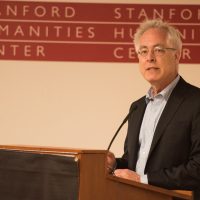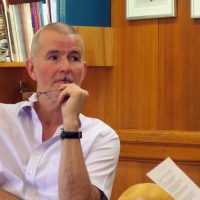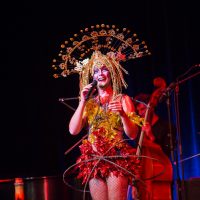Posts Tagged ‘Stanford Humanities Center’
Stanford Humanities Center 2020-2021 Fellows
Thirty-three fellows are named, including scholars of art history, the classics, comparative literature, dance and music.The Humanities Center offers residential fellowships for the academic year to Stanford and non-Stanford scholars at different career stages, giving them the opportunity to pursue their work in a supportive intellectual community.
Read MoreStanford University announces collaboration with Sundance Institute New Frontier Lab Programs designed to heighten creative visibility in underrepresented sectors
Sundance New Frontier Story Lab Fellow Stephanie Dinkins will further develop the “mind” of a learning artificial intelligence entity while on campus.Stanford’s new Institute for Human-Centered Artificial Intelligence (HAI), an interdisciplinary, global hub for artificial intelligence thinkers, learners, researchers, developers, builders and users, co-hosts its first HAI artist resident. The residency is a collaboration with Sundance Institute’s New Frontier Lab Programs (NFLP) and co-hosts on campus are the Office of the Vice President for the Arts…
Read MoreBritish novelist Zadie Smith to speak at Stanford
This year’s Stanford Presidential Lecture in the Humanities and Arts will feature acclaimed British author Zadie Smith on March 7.Zadie Smith, a prize-winning British novelist, essayist and short-story writer, will speak at Stanford to deliver the 2019 Stanford Presidential Lecture in the Humanities and Arts on Thursday, March 7. As part of the event, Smith will read from one of her works and then converse with Harry Elam Jr., vice president for the arts…
Read MoreLouis Menand unmasks the rock god in his cultural history of rock’n’roll
The Pulitzer Prize winner investigates rock’s origins at the 2018 Stanford Humanities Center’s Camp Memorial Lecture.Who invented rock’n’roll? It’s not who you think. At the Stanford Humanities Center’s 2018 Harry Camp Memorial Lecture, Pulitzer Prize-winning writer and cultural critic Louis Menand exposed rock’n’roll’s origin myths, shedding light on the power of media to shape cultural myths today. In his lecture, titled “Conditions for the Possibility of Rock’n’Roll: An Exercise in Cultural History,” Menand…
Read MoreResisting tyranny with humor: Timely lessons from the 1500s
GREG WALKER is the Bliss Carnochan International Visitor and a professor of English literature at the University of Edinburgh in Scotland. He studies late medieval and early Tudor literature and drama. His numerous books include, most recently, Imagining Spectatorship: From the Mysteries to the Shakespearian Stage (Oxford, 2016), co-authored with John J. McGavin, and Textual Distortion: Essays and Studies (Brewer,…
Read More20.8% of the 2017 MacArthur Fellows were Stanford guest artists within the last year
Stanford congratulates the MacArthur Foundation “genius grant” winners who recently spent time on campus engaging with students, faculty and the public. Nigerian-born, Los Angeles-based artist NJIDEKA AKUNYILI CROSBY, whose work tells elaborate and delicate stories of her life, was in conversation with Jodi Roberts, the Robert M. and Ruth L. Halperin Curator for Modern and…
Read MoreAdam Johnson wins National Book Award
Stanford English professor and Pulitzer Prize-winning novelist Adam Johnson earns a 2015 National Book Award for Fortune Smiles, a collection of short stories.Adam Johnson, a professor of English at Stanford and Pulitzer Prize-winning author, has received the 2015 National Book Award for fiction for his short story collection, “Fortune Smiles.” Winners of the award, which recognizes the best American literature, were announced on Wednesday at the 66th National Book Awards Benefit in New York City. The award,…
Read MoreArtistic works influence our minds and nervous systems, Stanford scholar reveals
Stanford theater historian Matthew Wilson Smith's new research shows how 19th century brain science has nerved its way into the drama of our lives, both onstage and off.No two disciplines could seem further apart than theater and science, but, as it turns out, they’re intimate bedfellows. As Stanford professor Matthew W. Smith has discovered, modern theater – and, by extension, film and television – basically owe their life to the scientific study of the nervous system. An associate professor of German studies…
Read MoreStanford scholars spy history of capitalist culture in Bond film songs
A musicologist and a literary scholar find a unique window into the evolution of capitalism and changing attitudes toward work in 50 years of James Bond movie theme songs.In the lead-up to Spectre, the latest film in the decades-long James Bond spy thriller franchise opening this week, much of the recent buzz has centered on another long-running 007 tradition – the title song. Amidst all the speculation about who would sing the new Bond song, Stanford scholars Adrian Daub and Charles Kronengold wrote…
Read MoreThrough photos and memorabilia, Stanford’s Allen Ginsberg collection captures a generation
Bill Morgan, the personal archivist to the acclaimed Beat Generation poet Allen Ginsberg, says that Ginsberg's legacy is as much about what he left behind as it is about his life and work. Everything from childhood diaries and personal correspondence to first editions of Ginsberg's works and all manner of printed ephemera make up the nearly 1,300 linear feet of material in Stanford's Allen Ginsberg Papers collection.Allen Ginsberg, the iconic figurehead of the Beat Generation, saved just about everything. Ginsberg’s vast array of memorabilia housed in the Stanford University Libraries’ Department of Special Collections proves that he was not just an observer of culture, but also a collector of culture. Bill Morgan, Ginsberg’s personal archivist, bibliographer and biographer, told a Stanford…
Read MoreThis is your brain on Jane Austen, and Stanford researchers are taking notes
Researchers observe the brain patterns of literary PhD candidates while they're reading a Jane Austen novel. The fMRI images suggest that literary reading provides "a truly valuable exercise of people's brains."The inside of an MRI machine might not seem like the best place to cozy up and concentrate on a good novel, but a team of researchers at Stanford are asking readers to do just that. In an innovative interdisciplinary study, neurobiological experts, radiologists and humanities scholars are working together to explore the relationship between…
Read More







